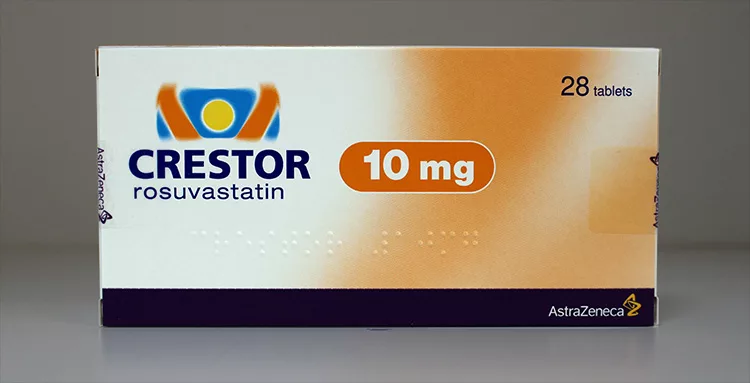Crestor - Product Description
Overview:
Crestor (rosuvastatin) is a powerful statin used to lower high cholesterol and triglycerides, helping to prevent heart disease and stroke. By inhibiting the HMG-CoA reductase enzyme, Crestor reduces LDL ("bad" cholesterol) and increases HDL ("good" cholesterol). It’s particularly effective in patients who require significant cholesterol reduction or are at high risk for cardiovascular events. Crestor also slows the progression of atherosclerosis, providing comprehensive cardiovascular protection. Typically taken once daily, Crestor is well-tolerated, but regular monitoring of liver function and cholesterol levels is essential to ensure safety and effectiveness. Its potency and proven efficacy make it a leading choice in cholesterol management.
Indications:
Crestor is indicated for the treatment of high cholesterol (hyperlipidemia), mixed dyslipidemia, and hypertriglyceridemia. It’s also prescribed to reduce the risk of heart attacks, strokes, and other cardiovascular events in patients with or at risk for coronary heart disease. Additionally, Crestor is used to slow the progression of atherosclerosis in patients with coronary artery disease. It’s suitable for adults and some children (ages 8 and older) with familial hypercholesterolemia, a genetic condition causing high cholesterol. Crestor’s indications make it a key medication for comprehensive lipid management and cardiovascular risk reduction.
How to Use:
Crestor is taken orally, usually once daily, with or without food. The dosage varies depending on the patient’s medical condition, response to treatment, and other medications being taken. It’s important to take Crestor at the same time each day to maintain consistent blood levels of the drug. Patients should follow their healthcare provider’s instructions closely and should not adjust the dose without consulting their doctor. Regular blood tests are required to monitor cholesterol levels and liver function. If a dose is missed, it should be taken as soon as remembered, unless it’s close to the next dose.
Advantages:
Crestor offers several advantages, including its potent LDL cholesterol reduction, which helps prevent the buildup of plaque in the arteries. It also raises HDL cholesterol, providing a balanced approach to lipid management. Crestor is effective at lower doses compared to some other statins, reducing the risk of side effects while delivering strong results. Additionally, its ability to slow the progression of atherosclerosis and reduce the risk of heart attacks and strokes makes it a comprehensive option for cardiovascular protection. Crestor’s efficacy, safety profile, and convenience of once-daily dosing contribute to its widespread use in managing cholesterol.
Conclusion:
Crestor is a potent and effective statin that plays a crucial role in managing high cholesterol and reducing cardiovascular risk. Its ability to significantly lower LDL cholesterol and triglycerides, while raising HDL cholesterol, makes it a powerful tool in preventing heart disease and stroke. By slowing the progression of atherosclerosis, Crestor offers long-term cardiovascular protection. While generally well-tolerated, it’s important for patients to use Crestor under medical supervision, with regular monitoring of cholesterol levels and liver function. Crestor’s proven benefits make it a top choice for patients requiring comprehensive cholesterol management.
Composition:
Crestor contains rosuvastatin calcium as its active ingredient. Rosuvastatin works by inhibiting HMG-CoA reductase, an enzyme involved in the synthesis of cholesterol in the liver. The tablet’s inactive ingredients typically include calcium phosphate, lactose monohydrate, magnesium stearate, microcrystalline cellulose, and titanium dioxide, which help stabilize the medication and ensure its absorption. Crestor’s formulation is designed to provide effective and consistent cholesterol reduction. Its composition also includes excipients that aid in the stability and delivery of the active ingredient, ensuring optimal performance.
Note:
Patients taking Crestor should be aware of potential side effects, including muscle pain, weakness, and liver enzyme abnormalities. Regular blood tests to monitor liver function and cholesterol levels are essential. Crestor should not be used during pregnancy or breastfeeding, as it may harm the fetus or infant. Patients should inform their healthcare providers about all medications and supplements they are taking, as Crestor can interact with certain drugs. It’s also important to maintain a healthy diet and lifestyle while on Crestor to maximize its benefits. Immediate medical attention should be sought if unexplained muscle pain, tenderness, or weakness occurs.






